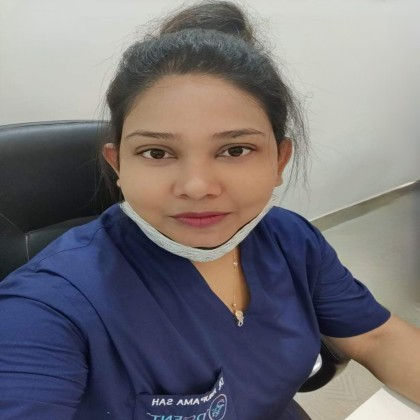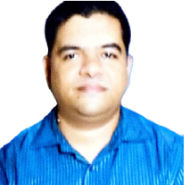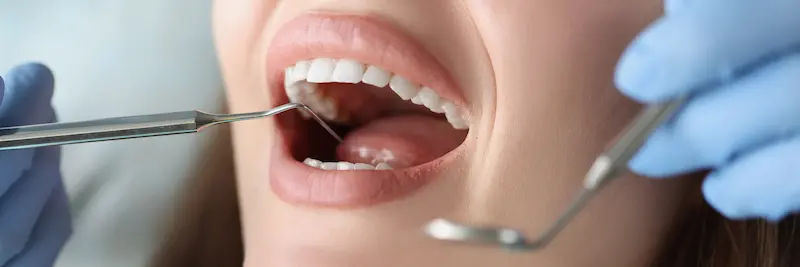Comprehensive Dental Examination for Children: What Parents Should Know
Learn essential strategies for children's dental care, from teaching proper brushing techniques to finding the right paediatric dentist for lasting oral health.

Written by
Last updated on 3rd Jul, 2025
Dental checkups and proper oral hygiene are the building blocks of paediatric dental care. These checkups, often advised at six-month intervals from the start of the first teething, play a significant role in preventing any complications.
A dental examination assesses a child's existing dental status, including the conditions of the teeth, strength of the gums, tooth alignment, and any manifestation of diseases and caries. This guide analyses the significance of dental examinations for children.
When Should Children Have Their First Dental Visit?
The American Academy of Pediatric Dentistry (AAPD) guidelines state that the first dental visit should occur before the age of 12 months or after the child’s first tooth appears, whichever is earliest.
This early visit serves multiple purposes. It soothes the child’s anxiety, identifies problems that may be present before the child starts forming cavities, and offers parental advice and recommendations.
Most people should visit the dentist every six months for a checkup and cleaning. However, these frequencies could be modified depending on someone’s requirements.
Children with cavities or other considerable oral health issues, such as a higher risk of cavities, embedded tooth decay, or gum issues, need more regular visits; usually every three months.
Preparing Children for a Dental Exam
The patient's examination involves an oral examination, scaling and prophylaxis, and, where necessary, X-ray photographs. During the visit, dentists assess emergencies, remove plaque, professionally cleanse teeth, and prescribe home care techniques.
Parents are also educated on practising proper oral hygiene and other precaution measures that suit their children.
Measures include choosing a paediatric dentist with extensive experience, explaining procedures in simple terms, and engaging in calming activities to reduce anxiety or panic before a visit.
Comfort items, distractions, and relaxation techniques may reduce anxiety during appointments.
The dentist may consider sedation for very anxious children. However, it is more comfortable to have open communication with all parties involved.
Components of a Paediatric Dental Examination
The assessment starts with a simple external evaluation of the teeth, gums, and various tissues in the mouth. Dentists analyse the growth and development of teeth and jaws and study occlusion. The assessment involves looking for grinds, thumb-sucking effects, and other activities that may affect proper dentition.
Professional cleaning includes scraping off stains, including plaque and tartar, using paediatric instruments, and thoroughly polishing to eliminate surface staining.
Fluoride preparations, applied as varnish or gel, aid in building up tooth enamel and afford necessary protection against decay.
Employing visual inspection and instrumental diagnostic techniques, dentists evaluate the state of each tooth and the areas where cavities are observed, namely the under contacts.
Dentists also assess the sequence of tooth emergence, observe the growing position, and determine any orthodontic complications that need early correction.
Importance of Preventive Dental Care
Proactive full check-ups help with early diagnoses, as dental disorders do not progress to highly complex ones if identified early. This approach is cost-effective, as it eliminates the most complicated treatments and contributes to child health overall.
Appropriate preventive check-ups enhance confidence by encouraging smiles and creating a positive perception of dental check-ups.
These include prophylaxes, which involve removing plaque and tartar accumulated on the teeth; topical fluoride, which strengthens the tooth enamel; and sealing, which involves painting the teeth surfaces most susceptible to dental caries.
Scheduled appointments help track general dental growth and uncover problems as they commence.
These professional treatments effectively prevent dental issues, which can be assisted by correct brushing and flossing at home and a rational diet.
Common Dental Issues in Children
Dental caries is still the most common oral health problem in children of all ages. It develops when bacteria in the mouth metabolise sugars, turning them into acids that dissolve the enamel on the teeth.
Children are more vulnerable to developing caries due to frequent snacking and consuming sweetened beverages. Signs of caries include white spots on teeth, which, in the following stages, may lead to the formation of cavities.
Gingivitis in children manifests as red, swollen, and bleeding gums due to the failure to remove the plaque along the gum line. Although it has an increased prevalence in adolescents than in children, gingivitis continues to be a significant issue in everyone during hormonal changes and other orthodontic treatments.
Proper hygiene practices like brushing and flossing teeth and visiting dental health professionals can help prevent swollen gums and unhealthy tissues. If natural soothing behaviours like thumb sucking persist after age 4, they may significantly impact dental development. Long-term habits can result in dental misalignment, such as an anterior open bite, an overbite, or a crossbite.
Consult Top Dentists for Personalised Treatment
Role of Diet and Nutrition in Dental Health
The nutritional needs for maintaining teeth and gum health entail a balanced meal well supplied with essential nutrients. Milk and other calcium-rich foods make tooth enamel harder, while green leaflets and vegetables contain vitamins and minerals needed for oral health.
Raw fruits and vegetables can be of benefit in that not only do they cause increased saliva production, but they also clean the teeth surfaces.
Vitamin D-rich foods, such as fatty fish, strengthen teeth by increasing calcium uptake.
Drinking plenty of water helps clean the oral cavity by washing out crude foods and neutralising harsh acids.
Educating Children About Oral Hygiene
Children require the teaching of oral hygiene principles in a structured manner. This begins with the selection of appropriate tools, such as a soft-bristled toothbrush designed for children and fluoride toothpaste suitable for their age.
The appropriate brushing position of 45 degrees against the tooth and gum should be explained, along with instructions to brush gently in circular motions.
Emphasis should be placed on cleaning all tooth surfaces, particularly the back teeth.
Brushing time should not exceed two minutes, and timers can be used to ensure children adhere to this limit.
Flossing instruction should be introduced only after children have mastered proper brushing techniques. Beginners may start with floss picks, which are more suitable for children than regular dental floss.
Routine brushing times should be established, preferably before bed and after breakfast.
Special Considerations for Children with Dental Anxiety
Children with dental anxiety display clear behavioural signs like frequently shivering, crying, or exaggerating symptoms like stomach problems before a scheduled appointment. They could demonstrate avoidance-oriented behaviour toward dental appointments.
Émotional symptoms usually manifest as increased heart rate, sweating, and discomfort. Effective communication serves as the basis for anxiety regulation.
Favourable, non-threatening terms should be used when speaking to a child, avoiding words such as ‘hurt’ or ‘pain.’
Children should be informed about upcoming dental visits through discussions and printed material explaining dental procedures.
Specific interventions during appointments may include the use of music, videos, or toys to distract children.
Formal measures, such as nitrous oxide, can be considered for more critical situations.
Simple relaxation techniques, such as deep breathing, can help children remain calm during dental procedures.
Conclusion
Managing childhood dental disorders requires creating proper oral hygiene regimens and procedures. By introducing healthy habits and selecting the right strategies, parents can help shape their child’s understanding of dental care. Consulting the appropriate professional ensures these positive perceptions will last a lifetime.
Consult Top Dentists
Consult Top Dentists for Personalised Treatment

Dr. Aritra Mandal
Dentist
6 Years • BDS, MDS (PERIODONTOLOGY)
Kolkata
COSMI DENTAL, Kolkata

Dr. Gourab Paul
Oral and Maxillofacial Surgeon
5 Years • BDS,MDS(ORAL AND MAXILLOFACIAL SURGERY)
Kolkata
SOLACE OF SOULS(SOS) HEALTH CARE, Kolkata
(50+ Patients)

Dr. Debarati Deb
Dentist
10 Years • BDS, MDS Oral Medicine and Radiology
Kolkata
Dr. Smile Multispeciality Dental Clinic, Kolkata

Dr. Anupama Kumari
Dentist
7 Years • BDS, MDS (Conservative Dentistry & Endodontics)
Chhapna
RA Dent Clinic, Chhapna

Dr. Swastik Satpathy
Dentist
10 Years • BDS
Bhubaneswar
INNOVATIVE SMILE, Bhubaneswar
Consult Top Dentists

Dr. Aritra Mandal
Dentist
6 Years • BDS, MDS (PERIODONTOLOGY)
Kolkata
COSMI DENTAL, Kolkata

Dr. Gourab Paul
Oral and Maxillofacial Surgeon
5 Years • BDS,MDS(ORAL AND MAXILLOFACIAL SURGERY)
Kolkata
SOLACE OF SOULS(SOS) HEALTH CARE, Kolkata
(50+ Patients)

Dr. Debarati Deb
Dentist
10 Years • BDS, MDS Oral Medicine and Radiology
Kolkata
Dr. Smile Multispeciality Dental Clinic, Kolkata

Dr. Anupama Kumari
Dentist
7 Years • BDS, MDS (Conservative Dentistry & Endodontics)
Chhapna
RA Dent Clinic, Chhapna

Dr. Swastik Satpathy
Dentist
10 Years • BDS
Bhubaneswar
INNOVATIVE SMILE, Bhubaneswar




